Franklin Energy’s Product Division, AM Conservation, Agrees to Acquire Energy Federation, Inc.
Heat Pump Buyers Guide - Everything You Need to Know
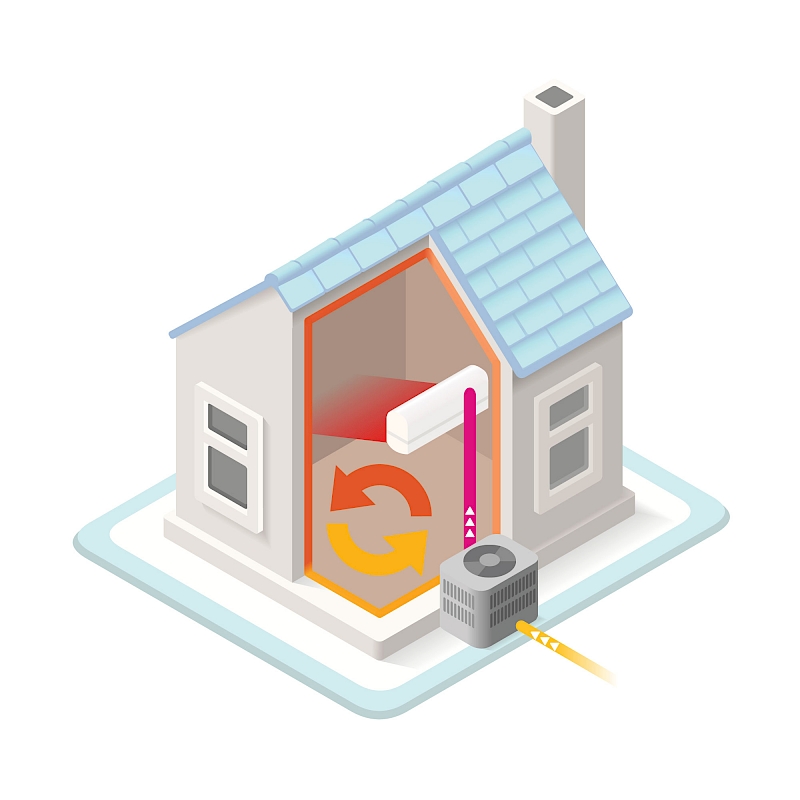 Energy Federation Incorporation
Energy Federation Incorporation
What is a heat pump?
A heat pump is a heating and cooling device that transfers thermal energy in and out of buildings through the use of refrigerant. Simply put, during the summer months, thermal energy is transferred outside to cool down the house, and during the winter months, thermal energy is transferred into the home to heat the house.
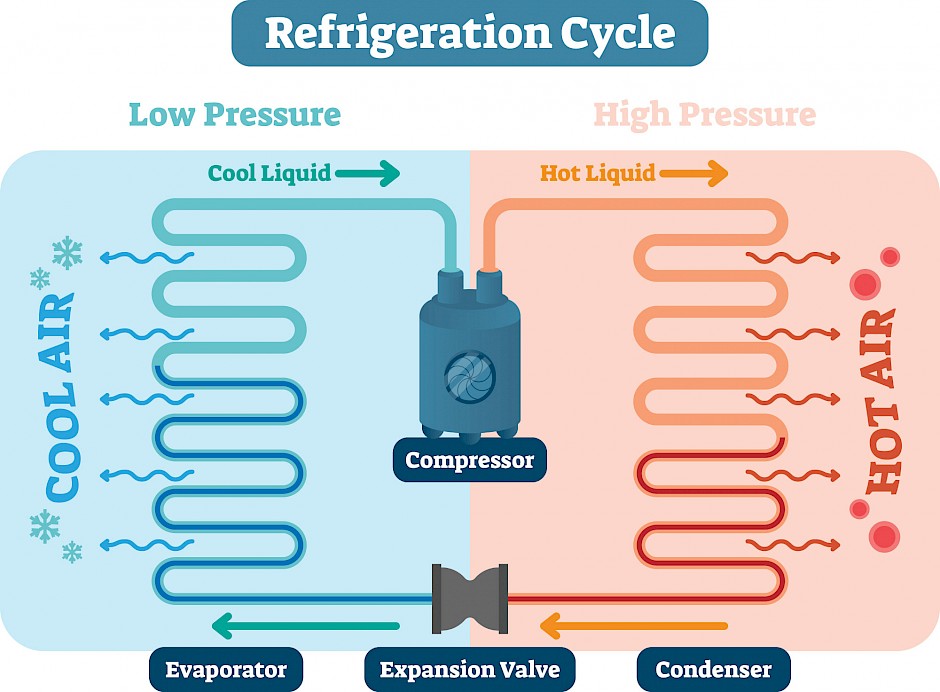
How does a heat pump work?
Heat pumps transfer thermal energy from one desired location to another. If you want to heat your home, a heat pump will transfer heat energy from outside into your home, and vice versa for when you're looking to cool your home. A basic thermal engineering concept explains how this works and simply put, it's that heat always wants to flow from areas of high energy to areas of low energy. This means that hot air (exothermic) is going to flow or be attracted toward cool air (endothermic). For example, if you were to take a glass of ice water outside on a hot summer day, the ice would melt. This is because there is more thermal energy (a higher temperature) in the air outside than that of the ice cubes inside the glass. Thus, the higher thermal energy is then attracted I know it seems simple, but this is the basis of how heat pumps work. The graphic below accurately illustrates the flow of thermal energy.
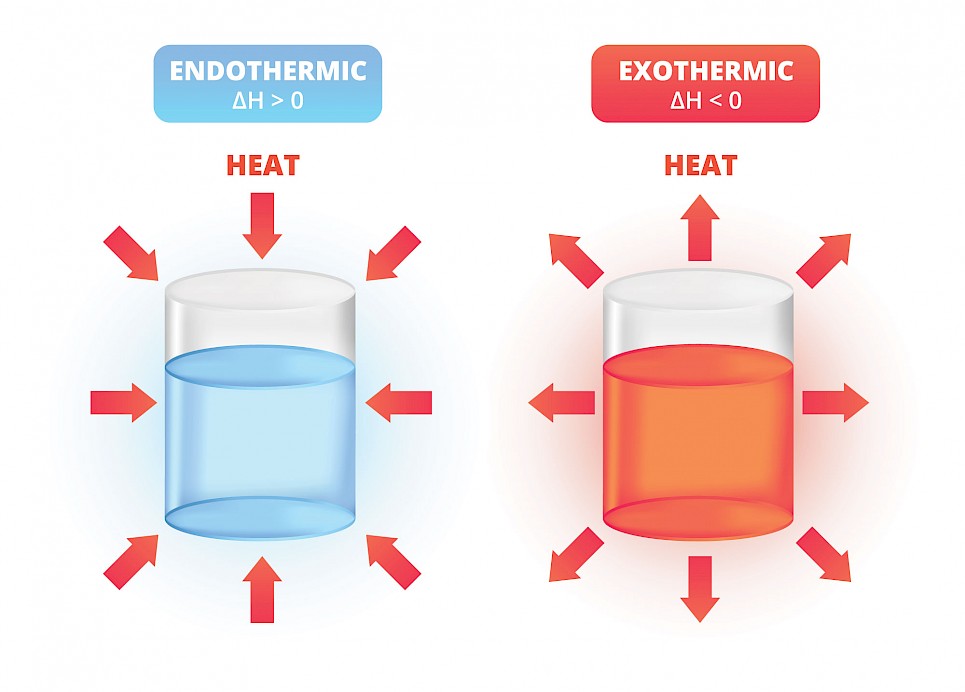
Every heat pump used refrigerant-filled lines to heat and/or cool a property throughout the year. Two instrumental components of each heat pump are the compressor and the expansion valve. The compressor and expansion valve play an important role in understanding how heat pumps work, so let’s take a look at them.
The Compressor

The compressor is responsible for heating the refrigerant in the refrigerant lines. At the beginning of the compression cycle, the cool refrigerant enters the compressor at a lower temperature, and it’s passed through the compressor. As it’s passed through the compressor, it’s heated up and turned into a high-pressure, high-temperature vapor. This high pressure, high-temperature vapor then is pumped into the house, and the warm thermal energy is then distributed through the house through an indoor heat exchanger (a.k.a an indoor air handler).
The Expansion Valve
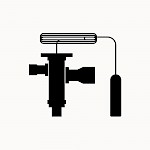
The expansion valve is responsible for cooling the refrigerant. As the refrigerant passes through the expansion valve, the refrigerant is expanded in volume and cooled down into a low pressure, low temperature, part liquid, and vapor mixture. This low pressure, low temperature, liquid, and vapor mixture is then pumped outside to the outdoor heat exchanger where it collects outdoor thermal energy. The cycle then repeats.
Types of Heat pumps
There are three types of heat pumps. There are air, ground, or water source heat pumps. Let's take a look at the way each of them works.
Air Source
Air source heat pumps are the easiest and the quickest to install. It looks like a normal AC unit, and it can generate both hot water and hot air. Some units also incorporate a reversing valve and a cooling mode to provide air conditioning as well. There is a unit installed outside that will create some noise from the fans and the compressors. The unit also needs to circulate air so it shouldn’t be boxed in, or else the unit is going to be trying to extract energy from the recirculated air that you just extracted energy from. These are the cheapest heat pumps that you can install, but they are the least efficient when compared to ground or water heat pumps. This is because air has a lower density than soil or water.
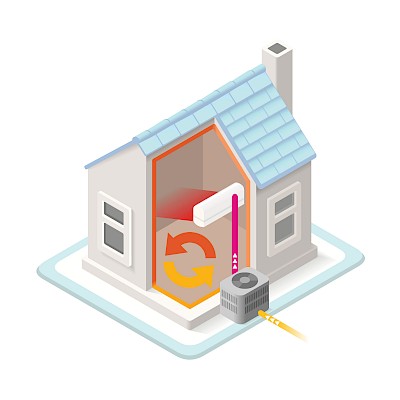
Cost - $7,000 - $11,000
(Cost varies on complexity, location, and size)
Ground Source (two types)
More commonly used for hot water production, but some units can be reversed to provide cooling. A ground source heat pump uses thermal energy that is embedded in the ground from the sun. They tend to be more efficient than air-source pumps because the soil has a much higher density and heat capacity than that of the air. Although this is far more efficient, it requires extensive excavation underground to set up refrigerant lines. Ground source heat pumps are often used during construction to limit cost.
Horizontal Ground Source Pumps
Horizontal ground source pumps are buried ~3-7ft in the ground and they typically extract 10-30 watts of energy per 3.3ft of pipe. Horizontal ground source pumps require a lot of room to be installed, and this is mainly why they are installed during the construction of the house
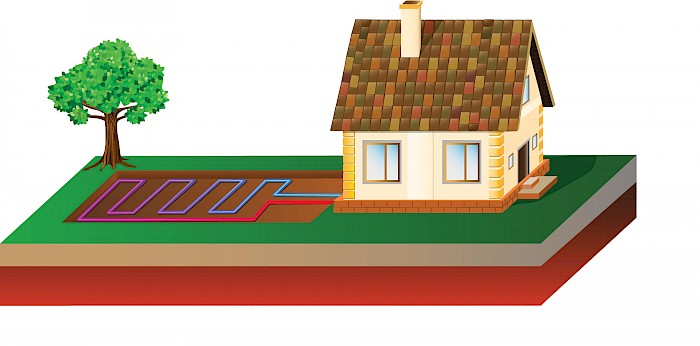
Cost: ~$13,000 - $24,000
(Cost varies on complexity, location, and size)
Vertical Ground Source Pumps
If there is less room on the property to build, vertical ground source pumps are an alternative. With vertical pumps, holes are drilled between 50 - 500 ft into the ground, and they typically extract about 10 - 50 watts of energy per meter of pipe.
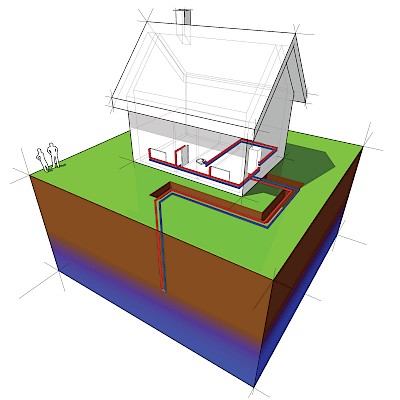
Cost: ~$18,000 - $32,000
(Cost varies on complexity, location, and size)
Water Source
Water source heat pumps are the least common type of heat pumps because they require immediate access to a lake or river. There are two types of water source heat pumps. There are open-loop water source heat pumps, and there are closed-loop water source heat pumps
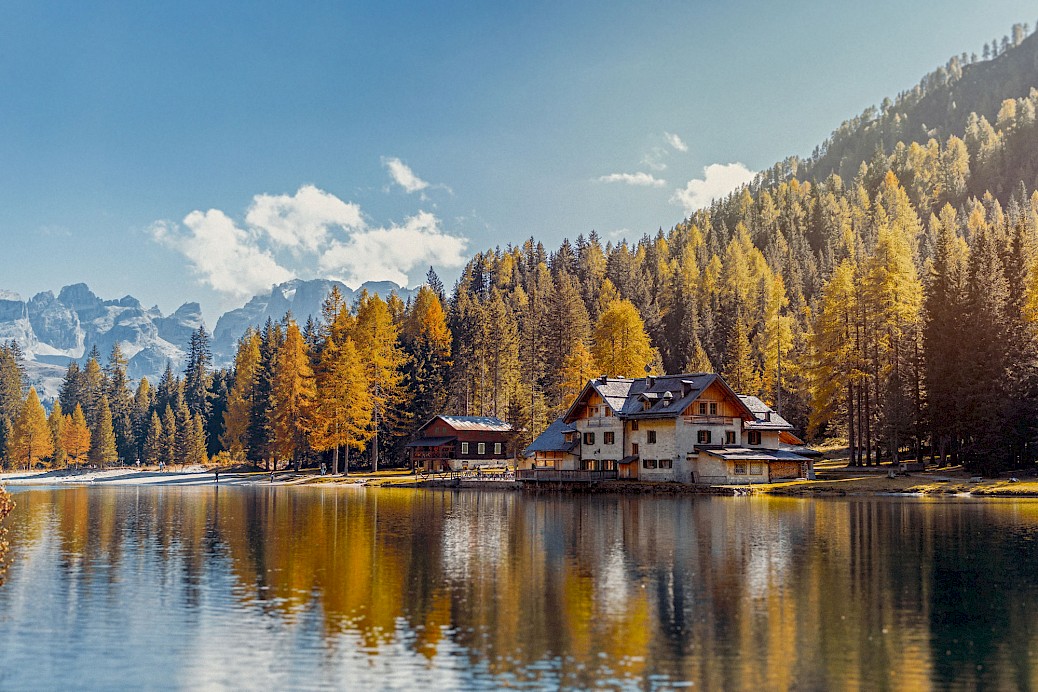
Closed Loop
As implied by the name, this is a closed-loop that is recirculated throughout the system. This system uses a water and antifreeze mixture to cycle around and transfer the thermal energy.
Cost: ~ $12,000 - $30,000
(Cost varies on complexity, location, and size)
Open loop
Alternatively, open-source loops pull in water from the lake or river, extract its thermal energy, and then release the water away from the extraction point. Open-loop heat pumps typically have strict permissions depending on your location, and for good reason. If your system were to leak, the water and antifreeze mixture would be toxic to the wildlife inside the lake or river. Although this has more potential to be dangerous to wildlife, it is more efficient than both air and ground heat pumps. The pipes are constantly surrounded by water energy that is constantly replaced by the current. They generate 20 - 60 watts of energy per 3 square feet of water surface. These are also easier to install than ground source pumps
Cost: ~ $10,000 - $15,000
(Cost varies on complexity, location, and size)
Which one should you buy?
When it comes to buying a heat pump, it comes down to your budget and some preexisting factors about your property. The heat pump that will be the best fit for your situation comes down to two main factors. Is the property being built, or is it near a lake or river? The graphic below goes through the thought process most people take when purchasing a heat pump.
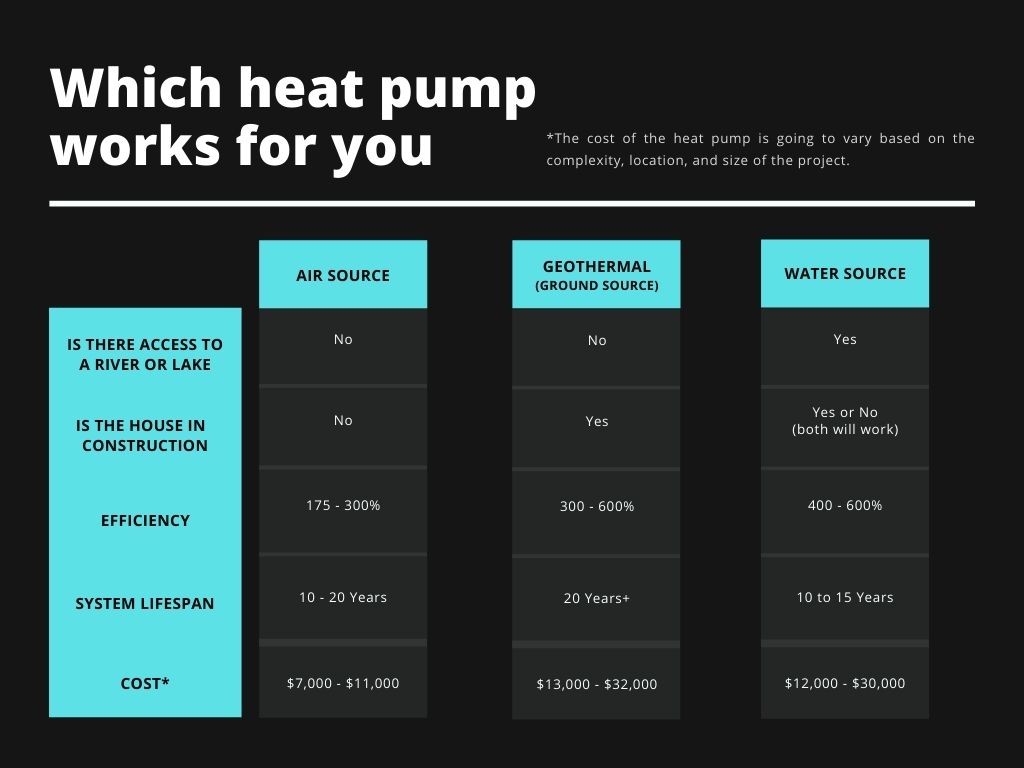
At the end of the day, it comes down to how much you would like to spend, and what would be best for your property. Properties normally fall into one of three categories, and each heat pump has its own advantages for each property.
- Existing Property
- With an existing property, it's most likely that the best heat pump for you is going to be an Air Source Heat Pump. They are the cheapest and easiest to install heat pump, and they are far more efficient than burning oil. Air source heat pumps are between 175-300% efficient whereas oil is only 85% efficient. Geothermal heat pumps aren't normally a great fit for existing properties because geothermal pumps require extensive excavation, and properties don't always have the room to support this excavation after they're built. This is also under the assumption that there is no immediate water source available.
- Under Construction (or planning to be constructed)
- If you are planning on building a house, geothermal heat pumps are most likely the heat pump for you. They can be expensive to put in after a house is built, but incorporating the cost of the pump in construction can save you a lot of money in the long run. Geothermal heats pump can more efficiently extract thermal energy from the ground than air source heat pumps can from the air. This is because the ground is denser than the air. These heat pumps are between 300-600% efficient whereas air source heat pumps are between 175-300% efficient.
- Properties with immediate access to a river or lake
- If your property has immediate access to a river or lake, then a water source heat pump is likely going to be the choice for you. Water source heat pumps are the most efficient heat pumps, and they typically are less expensive than a geothermal heat pumps. A water source heat pump is going to be between 400-600% efficient whereas a geothermal heat pump will be 300-600% efficient. Although water source heat pumps generally are less expensive than geothermal heat pumps, they tend to be the least common heat pumps. Simply because it is far less likely for a property to have access to a river or lake.
Sources:
Matt Ferrel - Is Geothermal Heating and Cooling Worth the Cost? Heat Pumps Explained
Fire and Ice Heating and Air Conditioning - How much does a heat pump cost
Consumer Reports - Heat Pump Buying Guide
The Engineering Mindset - Heat Pump Guide, how to select, compare, and efficiency rating HVAC
Fixr.com - How Much Does It Cost to Install a Geothermal Heating System?
U.S Department of Energy - Guide to Geothermal Heat Pumps
Jarboe's - What's the Difference Between an Air Conditioner and a Heat Pump
Subscribe
Resources
Customer Testimonials
Lets Talk!
Reach your customers & Exceed your goals
Contact EFI

